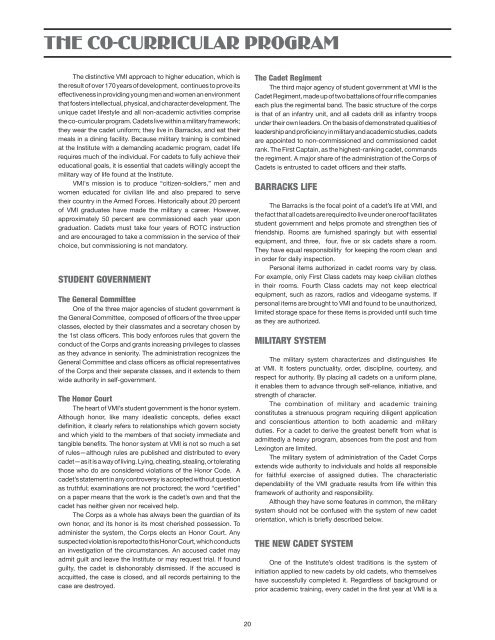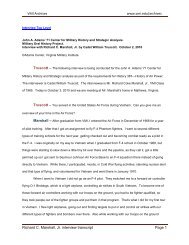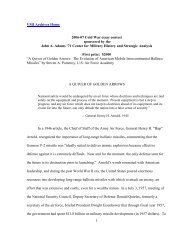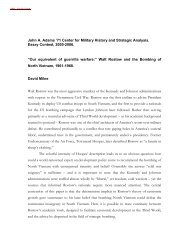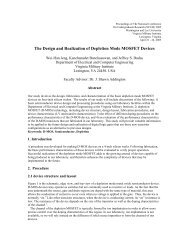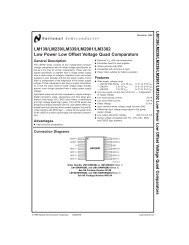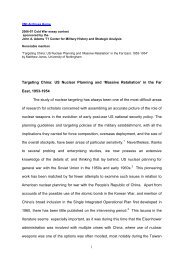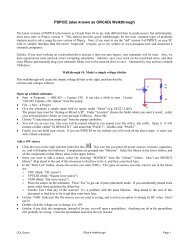Academic Catalog - Virginia Military Institute Admissions
Academic Catalog - Virginia Military Institute Admissions
Academic Catalog - Virginia Military Institute Admissions
Create successful ePaper yourself
Turn your PDF publications into a flip-book with our unique Google optimized e-Paper software.
The co-curricular program<br />
The distinctive VMI approach to higher education, which is<br />
the result of over 170 years of development, continues to prove its<br />
effectiveness in providing young men and women an environment<br />
that fosters intellectual, physical, and character development. The<br />
unique cadet lifestyle and all non-academic activities comprise<br />
the co-curricular program. Cadets live within a military framework;<br />
they wear the cadet uniform; they live in Barracks, and eat their<br />
meals in a dining facility. Because military training is combined<br />
at the <strong>Institute</strong> with a demanding academic program, cadet life<br />
requires much of the individual. For cadets to fully achieve their<br />
educational goals, it is essential that cadets willingly accept the<br />
military way of life found at the <strong>Institute</strong>.<br />
VMI's mission is to produce “citizen-soldiers,” men and<br />
women educated for civilian life and also prepared to serve<br />
their country in the Armed Forces. Historically about 20 percent<br />
of VMI graduates have made the military a career. However,<br />
approximately 50 percent are commissioned each year upon<br />
graduation. Cadets must take four years of ROTC instruction<br />
and are encouraged to take a commission in the service of their<br />
choice, but commissioning is not mandatory.<br />
STUDENT GOVERNMENT<br />
The General Committee<br />
One of the three major agencies of student government is<br />
the General Committee, composed of officers of the three upper<br />
classes, elected by their classmates and a secretary chosen by<br />
the 1st class officers. This body enforces rules that govern the<br />
conduct of the Corps and grants increasing privileges to classes<br />
as they advance in seniority. The administration recognizes the<br />
General Committee and class officers as official representatives<br />
of the Corps and their separate classes, and it extends to them<br />
wide authority in self-government.<br />
The Honor Court<br />
The heart of VMI’s student government is the honor system.<br />
Although honor, like many idealistic concepts, defies exact<br />
definition, it clearly refers to relationships which govern society<br />
and which yield to the members of that society immediate and<br />
tangible benefits. The honor system at VMI is not so much a set<br />
of rules—although rules are published and distributed to every<br />
cadet—as it is a way of living. Lying, cheating, stealing, or tolerating<br />
those who do are considered violations of the Honor Code. A<br />
cadet’s statement in any controversy is accepted without question<br />
as truthful; examinations are not proctored; the word “certified”<br />
on a paper means that the work is the cadet’s own and that the<br />
cadet has neither given nor received help.<br />
The Corps as a whole has always been the guardian of its<br />
own honor, and its honor is its most cherished possession. To<br />
administer the system, the Corps elects an Honor Court. Any<br />
suspected violation is reported to this Honor Court, which conducts<br />
an investigation of the circumstances. An accused cadet may<br />
admit guilt and leave the <strong>Institute</strong> or may request trial. If found<br />
guilty, the cadet is dishonorably dismissed. If the accused is<br />
acquitted, the case is closed, and all records pertaining to the<br />
case are destroyed.<br />
The Cadet Regiment<br />
The third major agency of student government at VMI is the<br />
Cadet Regiment, made up of two battalions of four rifle companies<br />
each plus the regimental band. The basic structure of the corps<br />
is that of an infantry unit, and all cadets drill as infantry troops<br />
under their own leaders. On the basis of demonstrated qualities of<br />
leadership and proficiency in military and academic studies, cadets<br />
are appointed to non-commissioned and commissioned cadet<br />
rank. The First Captain, as the highest-ranking cadet, commands<br />
the regiment. A major share of the administration of the Corps of<br />
Cadets is entrusted to cadet officers and their staffs.<br />
BARRACKS LIFE<br />
The Barracks is the focal point of a cadet’s life at VMI, and<br />
the fact that all cadets are required to live under one roof facilitates<br />
student government and helps promote and strengthen ties of<br />
friendship. Rooms are furnished sparingly but with essential<br />
equipment, and three, four, five or six cadets share a room.<br />
They have equal responsibility for keeping the room clean and<br />
in order for daily inspection.<br />
Personal items authorized in cadet rooms vary by class.<br />
For example, only First Class cadets may keep civilian clothes<br />
in their rooms. Fourth Class cadets may not keep electrical<br />
equipment, such as razors, radios and videogame systems. If<br />
personal items are brought to VMI and found to be unauthorized,<br />
limited storage space for these items is provided until such time<br />
as they are authorized.<br />
MILITARY SYSTEM<br />
The military system characterizes and distinguishes life<br />
at VMI. It fosters punctuality, order, discipline, courtesy, and<br />
respect for authority. By placing all cadets on a uniform plane,<br />
it enables them to advance through self-reliance, initiative, and<br />
strength of character.<br />
The combination of military and academic training<br />
constitutes a strenuous program requiring diligent application<br />
and conscientious attention to both academic and military<br />
duties. For a cadet to derive the greatest benefit from what is<br />
admittedly a heavy program, absences from the post and from<br />
Lexington are limited.<br />
The military system of administration of the Cadet Corps<br />
extends wide authority to individuals and holds all responsible<br />
for faithful exercise of assigned duties. The characteristic<br />
dependability of the VMI graduate results from life within this<br />
framework of authority and responsibility.<br />
Although they have some features in common, the military<br />
system should not be confused with the system of new cadet<br />
orientation, which is briefly described below.<br />
THE NEW CADET SYSTEM<br />
One of the <strong>Institute</strong>’s oldest traditions is the system of<br />
initiation applied to new cadets by old cadets, who themselves<br />
have successfully completed it. Regardless of background or<br />
prior academic training, every cadet in the first year at VMI is a<br />
20


